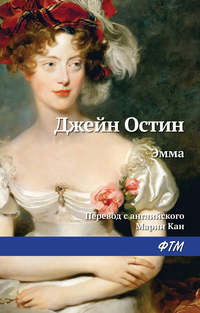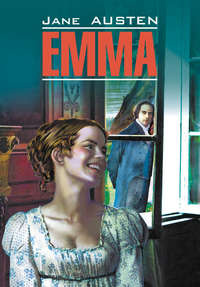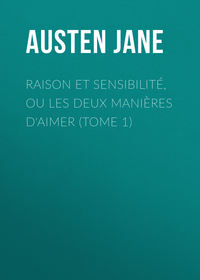
Полная версия
Mansfield Park
The houses, though scarcely half a mile apart, were not within sight of each other; but, by walking fifty yards from the hall door, she could look down the park, and command a view of the Parsonage and all its demesnes, gently rising beyond the village road; and in Dr Grant’s meadow she immediately saw the group: Edmund and Miss Crawford both on horseback, riding side by side, Dr and Mrs Grant, and Mr Crawford, with two or three grooms, standing about and looking on. A happy party it appeared to her, all interested in one object: cheerful beyond a doubt, for the sound of merriment ascended even to her. It was a sound which did not make her cheerful; she wondered that Edmund should forget her, and felt a pang. She could not turn her eyes from the meadow; she could not help watching all that passed. At first Miss Crawford and her companion made the circuit of the field, which was not small, at a foot’s pace; then, at her apparent suggestion, they rose into a canter; and to Fanny’s timid nature it was most astonishing to see how well she sat. After a few minutes, they stopped entirely. Edmund was close to her; he was speaking to her; he was evidently directing her management of the bridle; he had hold of her hand; she saw it, or the imagination supplied what the eye could not reach. She must not wonder at all this; what could be more natural than that Edmund should be making himself useful, and proving his good nature by any one? She could not but think, indeed, that Mr Crawford might as well have saved him the trouble; that it would have been particularly proper and becoming in a brother to have done it himself; but Mr Crawford, with all his boasted good nature, and all his coachmanship, probably knew nothing of the matter, and had no active kindness in comparison of Edmund. She began to think it rather hard upon the mare to have such double duty; if she were forgotten, the poor mare should be remembered.
Her feelings for one and the other were soon a little tranquillised, by seeing the party in the meadow disperse, and Miss Crawford still on horseback, but attended by Edmund on foot, pass through a gate into the lane, and so into the park, and make towards the spot where she stood. She began to be afraid of appearing rude and impatient; and walked to meet them with a great anxiety to avoid the suspicion.
‘My dear Miss Price,’ said Miss Crawford, as soon as she was at all within hearing, ‘I am come to make my own apologies for keeping you waiting; but I have nothing in the world to say for myself. I knew it was very late, and that I was behaving extremely ill; and therefore, if you please, you must forgive me. Selfishness must always be forgiven, you know, because there is no hope of a cure.’
Fanny’s answer was extremely civil, and Edmund added his conviction that she could be in no hurry. ‘For there is more than time enough for my cousin to ride twice as far as she ever goes,’ said he, ‘and you have been promoting her comfort by preventing her from setting off half an hour sooner: clouds are now coming up, and she will not suffer from the heat as she would have done then. I wish you may not be fatigued by so much exercise. I wish you had saved yourself this walk home.’
‘No part of it fatigues me but getting off this horse, I assure you,’ said she, as she sprang down with his help; ‘I am very strong. Nothing ever fatigues me, but doing what I do not like. Miss Price, I give way to you with a very bad grace; but I sincerely hope you will have a pleasant ride, and that I may have nothing but good to hear of this dear, delightful, beautiful animal.’
The old coachman, who had been waiting about with his own horse, now joining them, Fanny was lifted on hers, and they set off across another part of the park; her feelings of discomfort not lightened by seeing, as she looked back, that the others were walking down the hill together to the village; nor did her attendant do her much good by his comments on Miss Crawford’s great cleverness as a horsewoman, which he had been watching with an interest almost equal to her own.
‘It is a pleasure to see a lady with such a good heart for riding!’ said he. ‘I never see one sit a horse better. She did not seem to have a thought of fear. Very different from you, miss, when you first began, six years ago come next Easter. Lord bless you! how you did tremble when Sir Thomas first had you put on!’
In the drawing-room Miss Crawford was also celebrated. Her merit in being gifted by Nature with strength and courage, was fully appreciated by the Miss Bertrams; her delight in riding was like their own; her early excellence in it was like their own, and they had great pleasure in praising it.
‘I was sure she would ride well,’ said Julia, ‘she has the make for it. Her figure is as neat as her brother’s.’
‘Yes,’ added Maria, ‘and her spirits are as good, and she has the same energy of character. I cannot but think that good horsemanship has a great deal to do with the mind.’
When they parted at night, Edmund asked Fanny whether she meant to ride the next day.
‘No, I do not know—not if you want the mare,’ was her answer.
‘I do not want her at all for myself,’ said he; ‘but whenever you are next inclined to stay at home, I think Miss Crawford would be glad to have her a longer time—for a whole morning, in short. She has a great desire to get as far as Mansfield Common; Mrs Grant has been telling her of its fine views, and I have no doubt of her being perfectly equal to it. But any morning will do for this. She would be extremely sorry to interfere with you. It would be very wrong if she did. She rides only for pleasure; you for health.’
‘I shall not ride to-morrow, certainly,’ said Fanny; ‘I have been out very often lately, and would rather stay at home. You know I am strong enough now to walk very well.’
Edmund looked pleased, which must be Fanny’s comfort, and the ride to Mansfield Common took place the next morning: the party included all the young people but herself, and was much enjoyed at the time, and doubly enjoyed again in the evening discussion. A successful scheme of this sort generally brings on another; and the having been to Mansfield Common disposed them all for going somewhere else the day after. There were many other views to be shown; and though the weather was hot, there were shady lanes wherever they wanted to go. A young party is always provided with a shady lane. Four fine mornings successively were spent in this manner, in showing the Crawfords the country, and doing the honours of its finest spots. Everything answered; it was all gaiety and good humour, the heat only supplying inconvenience enough to be talked of with pleasure—till the fourth day, when the happiness of one of the party was exceedingly clouded. Miss Bertram was the one. Edmund and Julia were invited to dine at the Parsonage, and she was excluded. It was meant and done by Mrs Grant, with perfect good humour, on Mr Rushworth’s account, who was partly expected at the Park that day; but it was felt as a very grievous injury, and her good manners were severely taxed to conceal her vexation and anger till she reached home. As Mr Rushworth did not come, the injury was increased, and she had not even the relief of showing her power over him; she could only be sullen to her mother, aunt, and cousin, and throw as great a gloom as possible over their dinner and dessert.
Between ten and eleven, Edmund and Julia walked into the drawing-room, fresh with the evening air, glowing and cheerful, the very reverse of what they found in the three ladies sitting there, for Maria would scarcely raise her eyes from her book, and Lady Bertram was half asleep; and even Mrs Norris, discomposed by her niece’s ill humour, and having asked one or two questions about the dinner, which were not immediately attended to, seemed almost determined to say no more. For a few minutes, the brother and sister were too eager in their praise of the night and their remarks on the stars, to think beyond themselves; but when the first pause came, Edmund, looking around, said, ‘But where is Fanny? Is she gone to bed?’
‘No, not that I know of,’ replied Mrs Norris; ‘she was here a moment ago.’
Her own gentle voice speaking from the other end of the room, which was a very long one, told them that she was on the sofa. Mrs Norris began scolding.
‘That is a very foolish trick, Fanny, to be idling away all the evening upon a sofa. Why cannot you come and sit here, and employ yourself as we do? If you have no work of your own, I can supply you from the poor basket. There is all the new calico, that was bought last week, not touched yet. I am sure I almost broke my back by cutting it out. You should learn to think of other people: and take my word for it, it is a shocking trick for a young person to be always lolling upon a sofa.’
Before half this was said, Fanny was returned to her seat at the table, and had taken up her work again; and Julia, who was in high good humour, from the pleasures of the day, did her the justice of exclaiming, ‘I must say, ma’am, that Fanny is as little upon the sofa as anybody in the house.’
‘Fanny,’ said Edmund, after looking at her attentively, ‘I am sure you have the headache.’
She could not deny it, but said it was not very bad.
‘I can hardly believe you,’ he replied; ‘I know your looks too well. How long have you had it?’
‘Since a little before dinner. It is nothing but the heat.’
‘Did you go out in the heat?’
‘Go out! to be sure she did,’ said Mrs Norris: ‘would you have her stay within such a fine day as this? Were not we all out? Even your mother was out to-day for above an hour.’
‘Yes, indeed, Edmund,’ added her ladyship, who had been thoroughly awakened by Mrs Norris’s sharp reprimand to Fanny; ‘I was out above an hour. I sat three quarters of an hour in the flower-garden, while Fanny cut the roses, and very pleasant it was, I assure you, but very hot. It was shady enough in the alcove, but I declare I quite dreaded the coming home again.’
‘Fanny has been cutting roses, has she?’
‘Yes, and I am afraid they will be the last this year. Poor thing! She found it hot enough; but they were so full blown that one could not wait.’
‘There was no help for it, certainly,’ rejoined Mrs Norris, in a rather softened voice; ‘but I question whether her headache might not be caught then, sister. There is nothing so likely to give it as standing and stooping in a hot sun; but I dare say it will be well to-morrow. Suppose you let her have your aromatic vinegar; I always forget to have mine filled.’
‘She has got it,’ said Lady Bertram; ‘she has had it ever since she came back from your house the second time.’
‘What!’ cried Edmund; ‘has she been walking as well as cutting roses; walking across the hot park to your house, and doing it twice, ma’am? No wonder her head aches.’
Mrs Norris was talking to Julia, and did not hear.
‘I was afraid it would be too much for her,’ said Lady Bertram; ‘but when the roses were gathered, your aunt wished to have them, and then you know they must be taken home.’
‘But were there roses enough to oblige her to go twice?’
‘No; but they were to be put into the spare room to dry; and, unluckily, Fanny forgot to lock the door of the room and bring away the key, so she was obliged to go again.’
Edmund got up and walked about the room, saying, ‘And could nobody be employed on such an errand but Fanny? Upon my word, ma’am, it has been a very ill-managed business.’
‘I am sure I do not know how it was to have been done better,’ cried Mrs Norris, unable to be longer deaf; ‘unless I had gone myself, indeed, but I cannot be in two places at once; and I was talking to Mr Green at that very time about your mother’s dairy-maid, by her desire, and had promised John Groom to write to Mrs Jefferies about his son, and the poor fellow was waiting for me half an hour. I think nobody can justly accuse me of sparing myself upon any occasion, but really I cannot do everything at once. And as for Fanny’s just stepping down to my house for me—it is not much above a quarter of a mile—I cannot think I was unreasonable to ask it. How often do I pace it three times a day, early and late, ay, and in all weathers, too, and say nothing about it?’
‘I wish Fanny had half your strength, ma’am.’
‘If Fanny would be more regular in her exercise, she would not be knocked up so soon. She has not been out on horseback now this long while, and I am persuaded, that when she does not ride, she ought to walk. If she had been riding before, I should not have asked it of her. But I thought it would rather do her good after being stooping among the roses; for there is nothing so refreshing as a walk after a fatigue of that kind; and though the sun was strong, it was not so very hot. Between ourselves, Edmund,’ nodding significantly at his mother, ‘it was cutting the roses, and dawdling about in the flower-garden, that did the mischief.’
‘I am afraid it was, indeed,’ said the more candid Lady Bertram, who had overheard her; ‘I am very much afraid she caught the headache there, for the heat was enough to kill anybody. It was as much as I could bear myself. Sitting and calling to Pug, and trying to keep him from the flowerbeds, was almost too much for me.’
Edmund said no more to either lady; but going quietly to another table, on which the supper tray yet remained, brought a glass of Madeira to Fanny, and obliged her to drink the greater part. She wished to be able to decline it; but the tears, which a variety of feelings created, made it easier to swallow than to speak.
Vexed as Edmund was with his mother and aunt, he was still more angry with himself. His own forgetfulness of her was worse than anything which they had done. Nothing of this would have happened had she been properly considered; but she had been left four days together without any choice of companions or exercise, and without any excuse for avoiding whatever her unreasonable aunts might require. He was ashamed to think that for four days together she had not had the power of riding, and very seriously resolved, however unwilling he must be to check a pleasure of Miss Crawford’s, that it should never happen again.
Fanny went to bed with her heart as full as on the first evening of her arrival at the Park. The state of her spirits had probably had its share in her indisposition; for she had been feeling neglected, and been struggling against discontent and envy for some days past. As she leant on the sofa, to which she had retreated that she might not be seen, the pain of her mind had been much beyond that in her head; and the sudden change which Edmund’s kindness had then occasioned, made her hardly know how to support herself.
CHAPTER 8
Fanny’s rides recommenced the very next day; and as it was a pleasant fresh-feeling morning, less hot than the weather had lately been, Edmund trusted that her losses both of health and pleasure would be soon made good. While she was gone, Mr Rushworth arrived, escorting his mother, who came to be civil and to show her civility especially, in urging the execution of the plan for visiting Sotherton, which had been started a fortnight before, and which, in consequence of her subsequent absence from home, had since lain dormant. Mrs Norris and her nieces were all well pleased with its revival, and an early day was named, and agreed to, provided Mr Crawford should be disengaged; the young ladies did not forget that stipulation, and though Mrs Norris would willingly have answered for his being so, they would neither authorise the liberty, nor run the risk; and at last, on a hint from Miss Bertram, Mr Rushworth discovered that the properest thing to be done was for him to walk down to the Parsonage directly, and call on Mr Crawford, and inquire whether Wednesday would suit him or not.
Before his return, Mrs Grant and Miss Crawford came in. Having been out some time, and taken a different route to the house, they had not met him. Comfortable hopes, however, were given that he would find Mr Crawford at home. The Sotherton scheme was mentioned, of course. It was hardly possible, indeed, that anything else should be talked of, for Mrs Norris was in high spirits about it; and Mrs Rushworth, a well-meaning, civil, prosing, pompous woman, who thought nothing of consequence, but as it related to her own and her son’s concerns, had not yet given over pressing Lady Bertram to be of the party. Lady Bertram constantly declined it; but her placid manner of refusal made Mrs Rushworth still think she wished to come, till Mrs Norris’s more numerous words and louder tone convinced her of the truth.
‘The fatigue would be too much for my sister, a great deal too much, I assure you, my dear Mrs Rushworth. Ten miles there, and ten back, you know. You must excuse my sister on this occasion, and accept of our two dear girls and myself without her. Sotherton is the only place that could give her a wish to go so far, but it cannot be, indeed. She will have a companion in Fanny Price, you know, so it will all do very well; and as for Edmund, as he is not here to speak for himself, I will answer for his being most happy to join the party. He can go on horseback, you know.’
Mrs Rushworth being obliged to yield to Lady Bertram’s staying at home, could only be sorry. ‘The loss of her ladyship’s company would be a great drawback, and she should have been extremely happy to have seen the young lady too, Miss Price, who had never been at Sotherton yet, and it was a pity she should not see the place.’
‘You are very kind, you are all kindness, my dear madam,’ cried Mrs Norris; ‘but as to Fanny, she will have opportunities in plenty of seeing Sotherton. She has time enough before her; and her going now is quite out of the question. Lady Bertram could not possibly spare her.’
‘Oh no! I cannot do without Fanny.’
Mrs Rushworth proceeded next, under the conviction that everybody must be wanting to see Sotherton, to include Miss Crawford in the invitation; and though Mrs Grant, who had not been at the trouble of visiting Mrs Rushworth, on her coming into the neighbourhood, civilly declined it on her own account; she was glad to secure any pleasure for her sister; and Mary, properly pressed and persuaded was not long in accepting her share of the civility. Mr Rushworth came back from the Parsonage successful; and Edmund made his appearance just in time to learn what had been settled for Wednesday, to attend Mrs Rushworth to her carriage, and walk half-way down the park, with the two other ladies.
On his return to the breakfast-room, he found Mrs Norris trying to make up her mind as to whether Miss Crawford’s being of the party were desirable or not, or whether her brother’s barouche would not be full without her. The Miss Bertrams laughed at the idea, assuring her that the barouche would hold four perfectly well, independent of the box, on which one might go with him.
‘But why is it necessary,’ said Edmund, ‘that Crawford’s carriage, or his only, should be employed? Why is no use to be made of my mother’s chaise? I could not, when the scheme was first mentioned the other day, understand why a visit from the family were not to be made in the carriage of the family.’
‘What!’ cried Julia: ‘go, box’d up three in a post-chaise in this weather, when we may have seats in a barouche! No, my dear Edmund, that will not quite do.’
‘Besides,’ said Maria, ‘I know that Mr Crawford depends upon taking us. After what passed at first, he would claim it as a promise.’
‘And, my dear Edmund,’ added Mrs Norris, ‘taking out two carriages when one will do, would be trouble for nothing; and, between ourselves, coachman is not very fond of the roads between this and Sotherton; he always complains bitterly of the narrow lanes scratching his carriage, and you know one should not like to have dear Sir Thomas when he comes home, find all the varnish scratched off.’
‘That would not be a very handsome reason for using Mr Crawford’s,’ said Maria; ‘but the truth is, that Wilcox is a stupid old fellow, and does not know how to drive. I will answer for it, that we shall find no inconvenience from narrow roads on Wednesday.’
‘There is no hardship, I suppose, nothing unpleasant,’ said Edmund, ‘in going on the barouche box.’
‘Unpleasant!’ cried Maria: ‘oh dear! I believe it would be generally thought the favourite seat. There can be no comparison as to one’s view of the country. Probably Miss Crawford will choose the barouche box herself.’
‘There can be no objection, then, to Fanny’s going with you; there can be no doubt of your having room for her.’
‘Fanny!’ repeated Mrs Norris; ‘my dear Edmund, there is no idea of her going with us. She stays with her aunt. I told Mrs Rushworth so. She is not expected.’
‘You can have no reason, I imagine, madam,’ said he, addressing his mother, ‘for wishing Fanny not to be of the party, but as it relates to yourself, to your own comfort. If you could do without her, you would not wish to keep her at home?’
‘To be sure not, but I cannot do without her.’
‘You can, if I stay at home with you, as I mean to do.’
There was a general cry out at this. ‘Yes,’ he continued, ‘there is no necessity for my going, and I mean to stay at home. Fanny has a great desire to see Sotherton. I know she wishes it very much. She has not often a gratification of the kind, and I am sure, ma’am, you would be glad to give her the pleasure now?’
‘Oh, yes! very glad, if your aunt sees no objection.’
Mrs Norris was very ready with the only objection which could remain—their having positively assured Mrs Rushworth that Fanny could not go, and the very strange appearance there would consequently be in taking her, which seemed to her a difficulty quite impossible to be got over. It must have the strangest appearance! It would be something so very unceremonious, so bordering on disrespect for Mrs Rushworth, whose own manners were such a pattern of good-breeding, and attention, that she really did not feel equal to it. Mrs Norris had no affection for Fanny, and no wish of procuring her pleasure at any time; but her opposition to Edmund now, arose more from partiality for her own scheme, because it was her own, than from anything else. She felt that she had arranged everything extremely well, and that any alteration must be for the worse. When Edmund, therefore, told her in reply, as he did when she would give him the hearing, that she need not distress herself on Mrs Rushworth’s account, because he had taken the opportunity as he walked with her through the hall of mentioning Miss Price as one who would probably be of the party, and had directly received a very sufficient invitation for his cousin, Mrs Norris was too much vexed to submit with a very good grace, and would only say, ‘Very well, very well, just as you choose; settle it your own way; I am sure I do not care about it.’
‘It seems very odd,’ said Maria, ‘that you should be staying at home instead of Fanny.’
‘I am sure she ought to be very much obliged to you,’ added Julia, hastily leaving the room as she spoke, from a consciousness that she ought to offer to stay at home herself.
‘Fanny will feel quite as grateful as the occasion requires,’ was Edmund’s only reply, and the subject dropped.
Fanny’s gratitude, when she heard the plan, was, in fact, much greater than her pleasure. She felt Edmund’s kindness with all, and more than all, the sensibility which he, unsuspicious of her fond attachment, could be aware of; but that he should forgo any enjoyment on her account gave her pain, and her own satisfaction in seeing Sotherton would be nothing without him.
The next meeting of the two Mansfield families produced another alteration in the plan, and one that was admitted with general approbation. Mrs Grant offered herself as companion for the day to Lady Bertram in lieu of her son, and Dr Grant was to join them at dinner. Lady Bertram was very well pleased to have it so, and the young ladies were in spirits again. Even Edmund was very thankful for an arrangement which restored him to his share of the party, and Mrs Norris thought it an excellent plan, and had it at her tongue’s end, and was on the point of proposing it, when Mrs Grant spoke.








![Love and Freindship [sic]](/covers_200/25019987.jpg)
